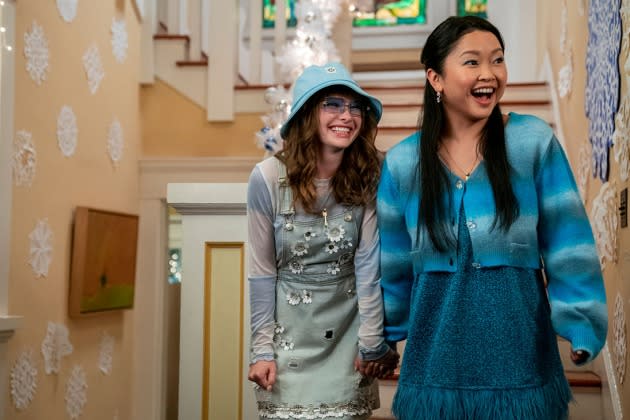Netflix’s ‘Boo, Bitch’: TV Review
- Oops!Something went wrong.Please try again later.
- Oops!Something went wrong.Please try again later.

No matter what certain producers might like to claim in interviews, a TV series is not just a long movie, nor should it be. Each medium has its own strengths and demands. But there are, arguably, certain advantages that movies have and shows don’t.
For instance: It’s one thing to wait out a rocky first act if you’ve committed to watching a whole movie. It’s another to push through when you need to decide every half-hour or so to keep watching. Boo, Bitch, from Erin Ehrlich (Crazy Ex-Girlfriend) and Lauren Iungerich (On My Block), suffers the misfortune of a dispiriting start — and though it does eventually evolve into something bitchy and heartfelt enough to be kind of fun, those early episodes make a poor case for sticking around long enough to find out.
More from The Hollywood Reporter
Lana Condor to Star in Randall Park-Penned Action Comedy Series at Hulu (Exclusive)
'To All the Boys' Star Lana Condor Spills Her Go-To Beauty Picks
The premise, at least, is intriguing: Two socially invisible high school seniors resolve to begin living their best lives, only for a freak accident to turn one of them into a literal ghost before they can really get started. Determined to “leave a legacy” with what little time she has left, Erika (Lana Condor) refashions herself into the ultimate queen bee, acquiring a new wardrobe, a growing social media following, a powerful frenemy (Aparna Brielle’s Riley) and a dreamboat boyfriend (Mason Versaw’s Jake C. — one of the series’ more solid low-key jokes is that all the coolest guys in school are named Jake). At her side nearly every step of the way is Gia (Zoe Colletti), her ride-or-die bestie of a decade.
Unfortunately, the first few chapters of the limited series are rough going, with a grating tone that aims for youthful irreverence à la Mean Girls or Glee and only occasionally reaches it. (And yes, the datedness of those references is part of my point.) Despite its brash title, Boo, Bitch isn’t nasty enough to draw blood. So what we’re left with often is a string of jokes that have the cadence of snarky comedy — the smash cuts, the rapid-fire dialogue, the purposefully awkward beats of silence — without the cutting wit to back them up. A teenage girl popping out a baby in the middle of a hot tub party could be a super dark gag, or a deeply silly one. Boo, Bitch only manages to steer it toward glib.
Meanwhile, its leading ladies, and the dynamic between them, starts out feeling as strained and artificial as anything else in the series. Both Erika and Gia are extremely high-strung, albeit in slightly different ways — Erika’s prone to dramatic declarations, and Gia to motormouthed rambling. In a device that’s too cutesy by half, they communicate with each other in elaborate acronyms that no human would ever use, spelled out for the audience in onscreen captions: “YBFOASSADFHIATT,” apparently, stands for “Your Best Friend’s On A Sinking Ship And Drowning Fast Hashtag I Am The Titanic.”
The series does start to pick up around the middle of the eight-episode season, as cracks in the girls’ friendship widen into rifts and then chasms. Colletti’s never-totally-convincing performance of awkwardness takes on softer, sweeter layers as Gia reckons with a new romance and the impending end of a friendship. But it’s Condor’s over-the-top performance of monstrous entitlement that really flips the switch. Having shot to fame as a consummate sweetheart in Netflix’s To All the Boys movies, she seems to relish the opportunity to play the asshole.
Condor’s Erika struts down school hallways in marabou-trim jackets, turns up her nose to look down through rhinestone-studded sunglasses, deploys a snotty drawl against those she considers beneath her attention and a sickly-sweet coo against those she wants to manipulate. Boo, Bitch isn’t saying anything about the superficiality of social media and the toxicity of teenagers that hasn’t been said before and better elsewhere. But Condor’s delicious scenery-chewing ensures that the series is at its most entertaining when it’s pushing Erika to deeper and deeper lows, encouraging us to root for her spectacular comeuppance.
When it does, the tone of the show shifts so suddenly it might cause whiplash. That Boo, Bitch goes out on a sentimental note isn’t necessarily surprising, but the fact that it works at all is a testament both to Condor’s innate charisma and to the superficiality of the scripts — it’s easier to accept or forgive a heel turn when it’s this gleefully cartoonish.
Despite its supernatural twist, Boo, Bitch isn’t especially concerned about questions of mortality; the looming threat of permanent ascension is treated as a heightened version of high school graduation, after which even friends as formerly close as Erika and Gia might go separately into the unknown. There is, it turns out, something sincere and relatable buried in all of Boo, Bitch‘s flippant exaggerations. If only it didn’t take so much work to dig it up.
Best of The Hollywood Reporter

